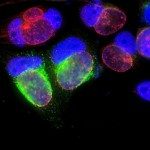Link to Pubmed [PMID] – 27405059
Sci Rep 2016 Jul;6:29421
Avian influenza virus subtype H9N2 (H9N2) and Chlamydia psittaci (C. psittaci) are frequently isolated in chickens with respiratory disease. However, their roles in co-infection remain unclear. We tested the hypothesis that C. psittaci enhances H9N2 infection through suppression of host immunity. Thus, 10-day-old SPF chickens were inoculated intra-tracheally with a high or low virulence C. psittaci strain, and were simultaneously vaccinated against Newcastle disease virus (NDV). Significant decreases in body weight, NDV antibodies and immune organ indices occurred in birds with the virulent C. psittaci infection, while the ratio of CD4+/CD8+ T cells increased significantly compared to that of the lower virulence strain. A second group of birds were inoculated with C. psittaci and H9N2 simultaneously (C. psittaci+H9N2), C. psittaci 3 days prior to H9N2 (C. psittaci/H9N2), or 3 days after H9N2 (H9N2/C. psittaci), C. psittaci or H9N2 alone. Survival rates were 65%, 80% and 90% in the C. psittaci/H9N2, C. psittaci+H9N2 and H9N2/C. psittaci groups, respectively and respiratory clinical signs, lower expression of pro-inflammatory cytokines and higher pathogen loads were found in both C. psittaci/H9N2 and C. psittaci+H9N2 groups. Hence, virulent C. psittaci infection suppresses immune response by inhibiting humoral responses and altering Th1/Th2 balance, increasing mortality in H9N2 infected birds.
